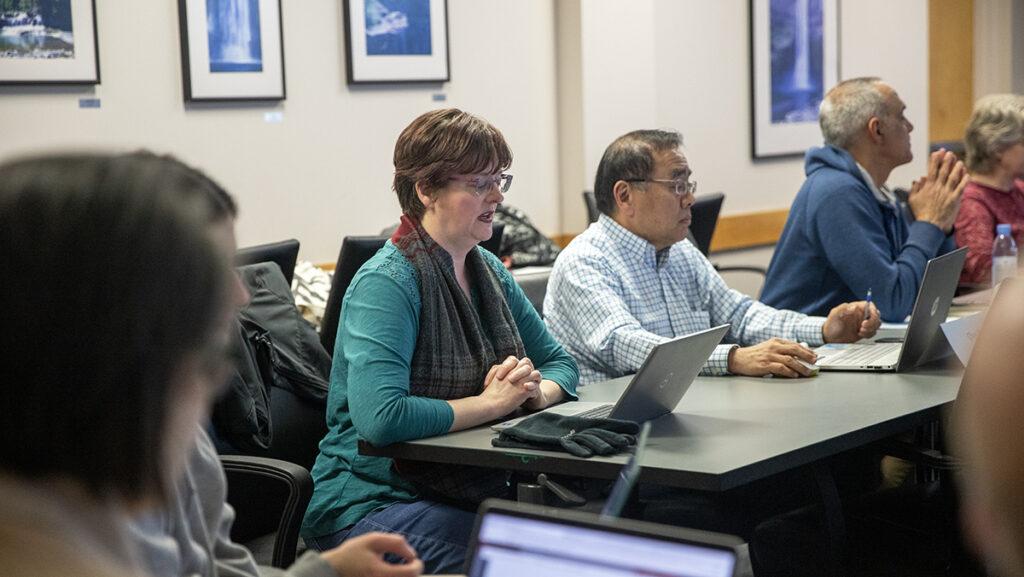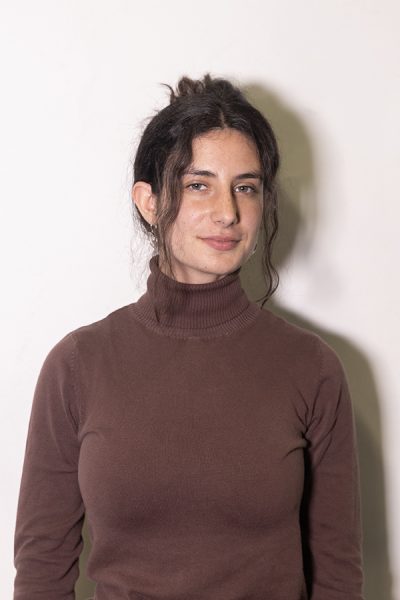At their April 4 meeting, Ithaca College Faculty Council members discussed non-tenure track faculty, student mental health, the academic misconduct process and academic freedom.
The provost’s report was canceled because Melanie Stein, provost and senior vice president of academic affairs, was out of town.
Cory Young, associate professor in the Department of Strategic Communication and director of the Honors Program, presented about a Non-Tenure-Eligible Notice Faculty Survey on behalf of the Faculty Handbook Amendment Committee. Young shared a PDF of the survey and asked for feedback from the council about what can be improved.
The survey asks questions about reapplying for NTEN status, applying for promotion from an NTEN position, the distribution of workload and how workload aligns with faculty contracts, the organization and communication of information about NTEN and more. The survey will have an optional section to identify the respondent’s demographics, but Young said the survey is meant to be anonymous. Young said the survey will come out in May.
Some faculty raised concerns about the anonymity of respondents if demographic data is collected. Lauren Steele, assistant professor in the Department of Media, Arts, Sciences, and Studies, said that there is already a lot of revealing information that is required, like school and length of time as NTEN.
“We’re promising anonymity but … it would not be difficult to identify people,” Steele said. “This is approaching more confidentiality. Having demographics in there just furthers that problem.”
Young clarified that the demographic data will not be used for identification, only to make sure the language in the survey is inclusive and that the survey is representative of different NTEN faculty. Lynne Hewitt, professor and chair of the Department of Speech-Language Pathology and Audiology, said language should always be inclusive, regardless of who is taking the survey, and without needing to collect demographic data.
Young said she would take this feedback to the Faculty Handbook Amendment Committee members and make a determination. She said all that the committee can do is make recommendations, but the Faculty Council along with the Provost’s Office, the president and the Board of Trustees all have approval powers.
“We thought long and hard about how to word these questions and this is super good feedback because we’re only four or five individuals [on the committee], so this helps open it up,” Young said.
The council then welcomed Brian Petersen, director of the Center for Counseling and Psychological Services, to present on how faculty can support students’ mental health, specifically through CAPS. Petersen said CAPS plans to hire another staff member in Fall 2023 to help replenish the two positions lost during the pandemic.
“We need to keep staffing, not only the numbers but also diversify the staff that we have so that any student at IC can come into our center and feel like there’s someone there who gets them,” Petersen said.
Petersen said faculty play a significant role in encouraging students to get help. Faculty can get involved in two ways: joining the JED task force or participating in trainings. One training provides certification for dealing with students’ mental health. Another option is a workshop, where CAPS shares data about mental health trends on campus and how academic units can create initiatives to help their students.
“It’s about identifying students in distress, ways to make the classroom supportive, how to speak with a student about mental health and suicide and the identification of resources not only here, but nationally,” Petersen said.
Petersen then highlighted some tools the college offers for students, faculty and staff. For example, Sanvello is an app that is offered to the entire campus community to help manage mental health.
“[Sanvello] is something that [anybody] can create their own kind of meditation or wellness or mindfulness packages and utilize any time of the day and night,” Petersen said.
Petersen said CAPS also has tools like the iCare form, light therapy in the CAPS office and classroom activities. David Gondek, associate professor in the Department of Biology, asked if some of the classroom activities could be developed for Ithaca Seminar courses so first-year students can be aware of mental health resources.
Susan Salahshor, assistant professor and program director of the Physician Assistant Program, asked about mental health resources for faculty since faculty and staff cannot use CAPS for counseling the way students can. Petersen mentioned the Employee Assistance Program, which is an independent organization that offers mental health counseling in addition to other counseling services.
“That is a way to at least get started or to talk about a crisis situation,” Petersen said. “We do offer consultation services to your office, but we can also offer that on an individual level as well, so if part of what you’re managing is your own stress reaction to a situation that you’re dealing with in the classroom … [CAPS can] bring in kind of a consultant model so that we can get around some ideas. … I’m happy to come in and help facilitate a discussion about what resources you already have that you could bring to bear.”
Ted Galanthay, associate professor and chair of the Department of Mathematics, asked what faculty should do with the resources that have now been presented. Petersen said he wants faculty to feel comfortable using the mental health resources to support students.
“I want to lower the mystery about what’s happening for students on campus,” Petersen said. “There’s a lot going on to support students, but I think faculty specifically [should] know that you can consult directly with the counseling center about a student you’re concerned about.”
After Petersen, Gondek presented a document proposing changes to the academic misconduct process. Gondek said the intention of the changes would be to align what the policy says with what usually ends up happening in judicial review cases.
Gondek said pre-judicial review meetings between students and the person filing the complaint will be optional and there will now be multiple levels of appeals with clearer language explaining those appeals. The changes have already gone through the Provost’s Office and the college’s lawyers, and upon being approved by the Faculty Council, will go to the Board of Trustees.
Gondek changed the topic to discuss academic freedom in response to recent issues with academic freedom at Hamline University and subsequent issues raised at other institutions, including Cornell University.
“What [the School of Humanities and Sciences faculty] asked is that the Faculty Council more clearly define or talk about academic freedom because there’s a lot of anxiety in the faculty body about what happens in the college, should this occur,” Gondek said. “What we would like to ask from amongst all of you is volunteers for a subcommittee that would be willing to maybe put together a one-page [document], whatever you want to produce.”
Steele; Jerome Fung, assistant professor in the Department of Physics and Astronomy; Vadim Serebryany, associate professor in the Department of Music Performance; and Jonathan Ablard, professor in the Department of History, volunteered for the council’s new subcommittee.
Toward the end of the meeting, Charis Dimaras, professor in the Department of Music Performance, brought up the offer from Belisa Gonzalez, professor and dean of Faculty Equity, Inclusion, and Belonging and outgoing director of the Center for the Study of Culture, Race and Ethnicity, from the last meeting to do a brief presentation on diversity training for search committees. Dimaras recommended the presentation occur at the council meeting in May when both new members and veteran members of the council will be gathered together.
“We can reach as many people as possible,” Dimaras said. “This is not going away, it’s just simply moved.”










